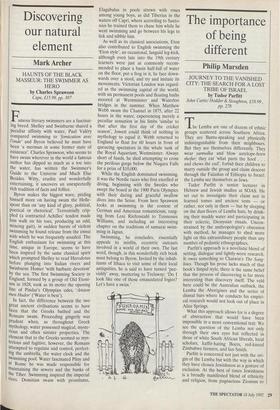Discovering our natural element
Mark Archer
HAUNTS OF THE BLACK MASSEUR: THE SWIMMER AS HERO by Charles Sprawson Cape, £15.99, pp. 307 Famous literary swimmers are a fascinat- ing breed. Shelley and Swinburne shared a peculiar affinity with water, Paul Valery compared swimming to fornication avec l'onde' and Byron believed he must have been 'a merman in some former state of existence'. Charles Sprawson, who seems to have swum wherever in the world a famous author has dipped so much as a toe into the water, has written the Swimmer's Guide to the Universe and Much Else Besides. Witty, erudite and wonderfully entertaining, it uncovers an unexpectedly rich tradition of facts and follies.
Byron makes the biggest wave, priding himself more on having swum the Helle- spont than on 'any kind of glory, political, poetical or rhetorical'. Terrestrially crip- pled (a contracted Achilles' tendon made him walk on his toes, producing an odd, mincing gait), in sudden bursts of violent swimming he found release from the ennui With which he was frequently assailed. The English enthusiasm for swimming at this time, unique in Europe, seems to have been inspired by the same classical spirit Which prompted Shelley to read Herodotus before plunging into Italian rivers and Swinburne Homer 'with barbaric devotion' by the sea. The first Swimming Society in England, formed by a group of Old Etoni- ans in 1828, took as its motto the opening line of Pindar's Olympian odes, Ariston men Hudor' Mater is best').
In fact, the difference between the two great ancient civilisations seems to have been that the Greeks bathed and the Romans swam. Proceeding gingerly was Prudent when, as throughout Greek Mythology, water possessed magical, myste- rious and often sinister properties. The element that to the Greeks seemed so mys- terious and fugitive, however, the Romans attempted to regulate and control, perfect- ing the umbrella, the water clock and the swimming pool. Water fascinated Pliny and at Rome he was made responsible for maintaining the sewers and the banks of the Tiber. Swimming inspired the imperial vices. Domitian swam with prostitutes, Elagabalus in pools strewn with roses among young boys, as did Tiberius in the waters off Capri, where according to Sueto- nius he trained them to chase him while he went swimming and go between his legs to lick and nibble him.
As well as its classical associations, Eton also contributed to English swimming the 'Eton style', an occasional, languid leg-kick, although even late into the 19th century learners were just as commonly recom- mended to place a basin half-full of water on the floor, put a frog in it, lie face down- wards over a stool, and try and imitate its movements. Victorian London was regard- ed as the swimming capital of the world, with six permanent pools and floating baths moored at Westminster and Waterloo bridges in the summer. When Matthew Webb swam the Channel in 1875, after 22 hours in the water, experiencing merely a peculiar sensation in his limbs 'similar to that after the first day of the cricket season', Jowett could think of nothing in mythology to equal it. Webb returned to England to float for 60 hours in front of queueing spectators in the whale tank of the Royal Aquarium, Westminster. Always short of funds, he died attempting to cross the perilous gorge below the Niagara Falls for a prize of $10,000.
While the English dominated swimming, it was the Nordic races who first excefied at diving, beginning with the Swedes who swept the board at the 1900 Paris Olympics with their daring and graceful swallow dives into the Seine. From here Sprawson looks at swimming in the context of German and American romanticism, rang- ing from Leni Riefenstahl to Tennessee Williams, and including an interesting chapter on the traditions of samurai swim- ming in Japan.
Swimming, he concludes, essentially appeals to misfits, eccentric outcasts involved in a world of their own. The last word, though, in this wonderfully rich book must belong to Byron. Invited by the inhab- itants of Ithaca to visit some of their local antiquities, he is said to have turned 'pee- vishly' away, muttering to Trelawny: 'Do I look like one of those emasculated fogies? Let's have a swim.'


















































 Previous page
Previous page